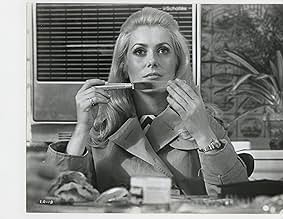Catherine Deneuve is one of film's all time great beauties who has also become a very fine actress. At this point in her career, she was still blank but beautiful. Her Director put this to good use, casting her as a woman who is pampered, spoiled, a woman for whom life has given her so much she is completely lost and has no idea what she really wants, but drifts from vague whim to whim. Of course, she is such a beauty that she is perfect casting for this kind of woman who has men falling over themselves just to light her cigarette, and the kind of jealousy and possessive controlling impulses beauty brings out in men.
Lightly handled, this film is a visual discussion of the true nature of love, and the tradeoffs we make in finding the right relationship. Money and stability, passion and poverty are contrasted, with some surprising revelations about what makes a love meaningful and lasting. Yves St. Laurent supplies the really amazing wardrobe for the sequences of wealth ( I counted at least 5 really flawlessly coutured coats), which seems at first to make this film very glossy and superficial and "what will she wear next" but this supplies our framework of seeing how unimportant these things are to her, and also builds a great contrast for the sections of everyday financial struggles.
This film is greater than the sum of it's parts. Great costumes, some postcard style cinematography, and a fine performance by Roger Van Hool as the obsessed Antoine, and an exceptional, nuanced performance by Michel Piccoli as Charles. (He and Deneuve had made several films together by this point, which augments the familiar feeling between them.)
Because DeNeuve is still young here, and the essential capricious coldness of her character, this film does not supply as much emotional connection or depth as it could. We have only Piccoli as a window for that, so this film becomes a man's view of the beautiful woman they adore, and a fine representation of their incomprehension of women. Historically, falling in step with "free love" and early feminism, it is a great representation of that special time when men really could not figure out what women wanted
because women were still trying to figure it out themselves.





























